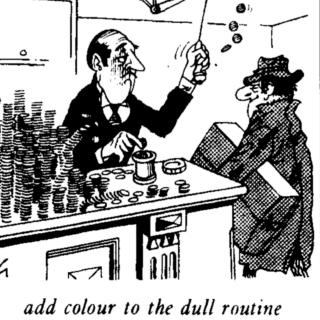
介绍:
Why did the shop assistant refuse to serve Dickie?
True eccentrics never deliberately set out to draw attention to themselves. They disregard social conventions without being conscious that they are doing anything extraordinary. This invariably wins them the love and respect of others, for they add colour to the dull routine of everyday life.
Up to the time of his death, Richard Colson was one of the most notable figures in our town. He was a shrewd and wealthy businessman, but most people in the town hardly knew anything about this side of his life. He was known to us all as Dickie and his eccentricity had become legendary long before he died.
Dickie disliked snobs intensely. Though he owned a large car, he hardly ever used it, preferring always to go on foot. Even when it was raining heavily, he refused to carry an umbrella. One day, he walked into an expensive shop after having been caught in a particularly heavy shower. He wanted to buy a $300 watch for his wife, but he was in such a bedraggled condition than an assistant refused to serve him. Dickie left the shop without a word and returned carrying a large cloth bag. As it was extremely heavy, he dumped it on the counter. The assistant asked him to leave, but Dickie paid no attention to him and requested to see the manager. Recognizing who the customer was, the manager was most apologetic and reprimanded the assistant severely. When Dickie was given the watch, the presented the assistant with the cloth bag. It contained $300 in pennies. He insisted on the assistant's counting the money before he left -- 30,000 pennies in all! On another occasion, he invited a number of important critics to see his private collection of modern paintings. This exhibition received a great deal of attention in the press, for though the pictures were supposed to be the work of famous artists, they had in fact been painted by Dickie. It took him four years to stage this elaborate joke simply to prove that critics do not always know what they are talking about.
真正古怪的人从不有意引人注意。他们不顾社会习俗,意识不到自己所作所为有什么特殊之处。他们总能赢得别人的喜爱与尊敬,因为他们给平淡单一的日常生活增添了色彩。
理查德.科尔森生前是我们镇上最有名望的人之一。他是个精明能干、有钱的商人,但镇上大部分人对他生活中的这一个方面几乎一无所知。大家都管他叫迪基。早在他去世前很久,他的古怪行为就成了传奇故事了。
迪基痛恨势利小人。尽管他有一辆豪华小轿车,但却很少使用,常常喜欢以步代车。即使大雨倾盆,他也总是拒绝带伞。一天,他遇上一场瓢泼大雨,淋得透湿。他走进一家高级商店,要为妻子买一块价值300英镑的手表。但店员见他浑身泥水的样子,竟不肯接待他。迪基二话没说就走了。一会儿,他带着一个大布口袋回到 店里。布袋很沉,他重重地把布袋扔在柜台上。店员让迪基走开,他置之不理,并要求见经理。经理认出了这位顾客,表示了深深的歉意,还严厉地训斥了店员。店员为迪基拿出了那块手表,迪基把布口袋递给他,口袋里面装着300镑的便士。他坚持要店员点清那些硬币后他才离去。
lovable adj. 可爱的
eccentric n. (行为)古怪人
disregard v. 不顾,漠视
convention n. 习俗,风俗
conscious adj. 感觉到的,意识到的
invariably adv. 总是,经常地
routine n. 常规;惯例
shrewd adj. 精明的
eccentricity n. 怪僻
legendary adj. 传奇般的
snob n. 势利小人,谄上欺下的人
intensely adv. 强烈地
bedraggled adj. 拖泥带水的
dump v. 把……砰的一声抛下
apologetic adj. 道歉的
reprimand v. 训斥
stage v. 暗中策划
elaborate adj. 精心构思的
1 set out to do sth,打算,企图做某事。
2 draw attention to…,作“引起对...的注意”讲。
3 without being conscious that...,没有意识到...。
这是介词短语作状语,be conscious that…作“意识到...”解。
4 This invariably wins them the love and respect of others.这常常赢来人们对他们的爱戴和尊敬。
win sb. sth.,作“使某人获得某事(物)”讲。
5 add…to,把...添加到...。
6 this side of his life,他生活中这方面的情况。
这里指的是He was a shrewd and wealthy businessman.
7 be caught in,作“突然遇上、碰上”讲。
8 Recognizing who the customer was, the manager was most apologetic…
由于经理认出这个顾客是谁了,便竭力陪礼道歉……。这句话用现在分词短语作原因状语,most在这里起加强语气的作用,相当于very。
9 insisted on the assistant's counting 坚持让店员点清。
insist on后接动名词,the assistant's是动名词的逻辑主语。
大家还在听

